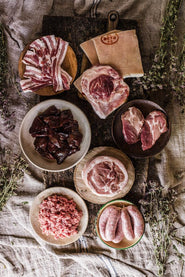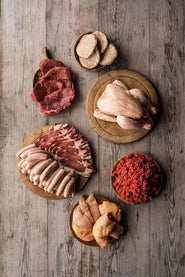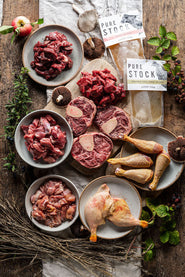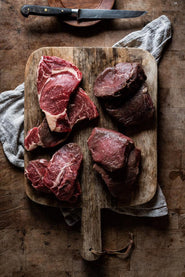In 1987, Pipers Farm was born in an industrial chicken shed. The shed on the farm that I was brought up on. There were only 35,000 chickens in the shed, and the unit was only producing 300,000 chickens per year.
My father had started the unit in the early 1950′s when he had brought the concept over from the States. His first shed had 7,500 chickens in it and the chicken took about 14 weeks to reach to finished weight.
By selecting the right genetics for fast growth and efficient feed conversion this was drastically reduced by the mid 1980′s to 6 weeks. As the geneticists delivered faster growth rates the ‘number crunchers’ were keen to find other ways that they could bring down the unit cost of each chicken. These were not hard to work out.
Animal Farming and the Pressure Game
Each farming unit should get bigger, and as they were ‘encouraged’ to get bigger, the farmer was encouraged to get deeper into debt, to banks or food processors, so that they were in a weak bargaining position & less able to resist their demands.
Eventually, my brother took on my father’s unit and, although he was very good at growing chickens, he was told by the processor that 300,000 chickens per year was simply ‘not worth their while’. They wanted him to invest heavily in the site, whilst at the same time warning that the money he could make on each chicken was likely to keep reducing. In the end, he gave up growing chickens.
But the farmers who keep going are serviced by feed mills that get bigger and bigger; the factories that kill their chickens continually get bigger and work faster.
It is no wonder that saving cost on every chicken yields huge benefits for the giants: 850 million chickens are produced annually in the UK, and a massive 10 billion chickens produced each year in the US.
And the pressure put on the processors, who in turn apply relentless pressure on the farmers, comes from competition in the ‘High Street’ to sell apparently cheaper and cheaper food.
And because the economies of scale in the US are so vast, the tiny number of industrial giants who control the food chain in the US are spreading their power around the world. The number crunchers hold the reins of power and make the key decisions, and the decisions are a very long way from the interests of the individual – whether it be an animal, a farmer or even a consumer.
The food chain has got longer and longer and the fat cats dragging the chain have got fatter and more powerful.
The individual links are not respected and values are not appreciated.
How Industrialisation Destroyed the Integrity of the Food Chain
Before the industrialisation of the food chain, the mixed family farm was run by common sense. There had to be a harmony with, and a respect for nature. And the common sense of how to farm that particular piece of land was often handed down through generations. The farmers would eat and enjoy food produced on their farm. And very often the food from local farms was sold in local shops. And a large proportion of the money spent in local shops stayed in the local economy. And the customers who ate their food, or the feed mill who processed their grain, were known by the farmer.
There was integrity in the local food chain because ‘word would soon get round’ if there wasn’t!
A globalised, industrialised food chain is the opposite of those traditional values.
Why Cheap Food is Not Necessarily Good Value
As the number crunchers have relentlessly pursued ‘lowest unit cost’ and a better share price, have they really been focussed…
On wholesome nutrition?
Or on the conditions in which the ‘animal units’ are grown?
Or the medication they are fed to make them grow faster or simply to keep them alive?
Or the destructiveness of breaking up sustainable local food and rural communities, where ‘values’ have been handed down and respected for generations?
The ‘horsemeat scandal’ has been a long time in coming to light but has been brewing for years. No amount of assurance schemes on paper, or misleading labels, or reams of red tape will change the nature of this brew anytime soon.
If the huge companies mobilise their PR machines, and Whitehall sticks another layer of tape on the vat, then maybe the stench of the industrialised food system will be suppressed for a bit longer, but it is going to be a long time before the brew changes character.







